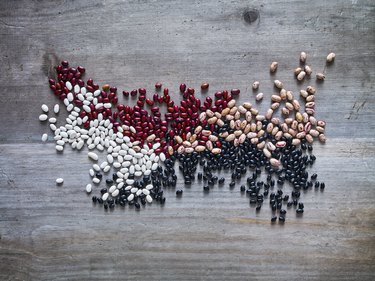
Ever eaten a generous helping of beans and then wished you hadn't because of the embarrassing sounds — and smells — that followed? Here's what you need to know about the most and least gassy beans and whether canned beans can help with gas prevention.
Read more: The Side Effects of Beans
Video of the Day
Video of the Day
Most and Least Gassy Beans
Also known as flatulence, or flatus, gas is air from your intestine that you pass from your bottom. According to the U.S. National Library of Medicine, it is normal for gas to be produced in your intestines when your body digests food. While many people think they produce a lot of gas, it is in fact normal for people to pass gas roughly 20 times a day.
Some foods are more likely to give you gas than others. An April 2016 study published in the Iranian Red Crescent Medical Journal lists beans, lentils, fried and fatty foods, sour and spicy foods, coffee, tea, cocoa, ice and cold beverages as some of the foods that are likely to give you a lot of gas.
Among beans, the National Institutes of Health (NIH) says that black beans, navy beans, kidney beans and pinto beans are more likely to give you gas. Black-eyed beans on the other hand, are among the least gassy beans, according to the Cleveland Clinic.
Why Do Beans Cause Gas?
Wondering about the connection between beans and flatulence? Two specific nutrients in beans can cause gas.
The first is fiber. Beans are a rich source of fiber; per the Cleveland Clinic, just a half-cup of beans has 6 to 8 grams of fiber. Fiber is an indigestible component of plant-based foods so it passes through your digestive system intact.
If you have recently increased your fiber intake, your body may be struggling to cope with it. However, the Cleveland Clinic notes that if you start eating beans regularly, your digestive system will adjust to it eventually and eating beans won't give you as much gas.
Beans also contain carbs. The International Foundation for Gastrointestinal Disorders explains that while eating protein and fat doesn't necessarily cause gas, eating carbs does because the bacteria in your gut acts on the carbs and ferments them.
The carb content in beans can also exacerbate irritable bowel syndrome, according to a September 2012 study published in the journal Current Opinion in Clinical Nutrition and Metabolic Care.
Canned Beans For Gas Prevention
Harvard Medical School says that you shouldn't miss out on beans just because they cause gas, since beans are loaded with nutrients like fiber, protein, iron, potassium, magnesium and B vitamins. They are low in fat and can also help reduce your risk of conditions like cancer, high blood pressure and heart disease.
There are a couple of tricks you can try to help make beans less gassy. For instance, the Mayo Clinic suggests opting for canned beans for gas prevention; the canning process helps break down some of the carbohydrates in the beans, making them easier to digest and less likely to cause gas.
Another trick is to soak the beans in water either before you cook them or after you boil them, to help get rid of some of the gas-producing carbs. The NIH recommends soaking them overnight in plenty of water. The Mayo Clinic says that changing the water multiple times can help reduce the carb content further.
Read more: Does Eating Beans Help You Lose Weight?
- U.S. National Library of Medicine: “Gas — Flatulence”
- Columbia University: “Beans Cause Gassy Discomfort — Any Relief?”
- Iranian Red Crescent Medical Journal: “Prevention and Treatment of Flatulence From a Traditional Persian Medicine Perspective”
- National Institutes of Health: “Symptoms and Causes of Gas in the Digestive Tract”
- Cleveland Clinic: “What You Should Know About Beans and the (Embarrassing) Gas They Cause”
- International Foundation for Gastrointestinal Disorders: “Foods That May Cause Gas”
- Current Opinion in Clinical Nutrition and Metabolic Care: “Intestinal Gas: Has Diet Anything to Do in the Absence of a Demonstrable Malabsorption State?”
- Harvard Medical School: “What to Do When Gas Gets You Down”
- Mayo Clinic: “Nutrition and Healthy Eating”
- National Institutes of Health: “Healthy Food Trends — Beans and Legumes”
Is this an emergency? If you are experiencing serious medical symptoms, please see the National Library of Medicine’s list of signs you need emergency medical attention or call 911.